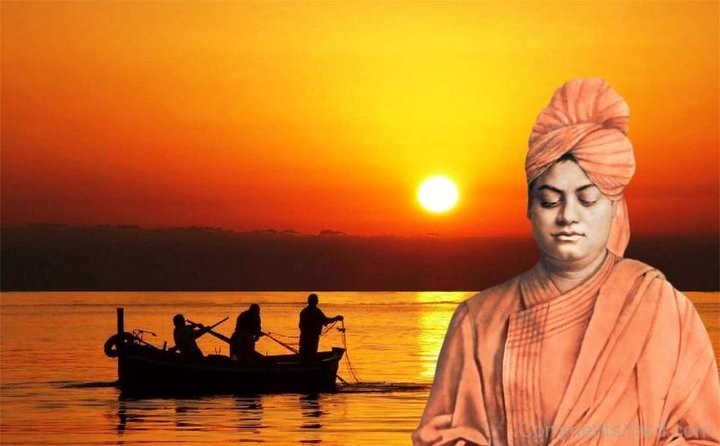Swami Vivekananda : A key figure to introduce Indian philosophies of Vedanta and Yoga to Western world
Religion and spirituality are two things that are probably the most difficult to define in definite terms. It would be wrong to say that spirituality and religion don’t go hand in hand because they do; the only difference is that while religion is an organised system that pays homage to a god, spirituality is something that does not always need a deity to define the parameters of the person’s spiritual conduct. Throughout history there have been people who have played the roles of, both, spiritual and religious leaders for their societies. Some of them have done such exemplary work, with such dedication, that their work, and in turn they themselves, were recognised the world over for their steadfast dedication and wisdom in guiding their flock. Their cant be a better day than 15th August, our Independence day to pay Homage to these great leaders.
Swami Vivekananda:
Swami Vivekananda was born as Narendranath Datta to Vishwanath Datta and Bhuvaneshwari Devi. He was deeply inspired by his parents who shaped much of his personality and thought process. It was since a young age that Narendra had a spiritual bent of mind. He had not only studied Western logic and philosophy but had even read Hindu scriptures in details. Post college, he became a spiritual apprentice.
Spiritual Attainment:
Narendra met Ramakrishna in 1881 at Dakhineshwar. During this time, Narendra was undergoing a time of spiritual crisis. It was his famous question to Sri Ramakrishna, “Have you seen God?” which transformed his life forever.Though Ramakrishna did not convince Narendra completely at the first go, Narendra was impressed by his selfless, unconditional love. Gradually, he became a frequent visitor of Ramakrishna.
Read Also : ON THE REMEMBERANCE DAY: PRAMUKH SWAMI MAHARAJ (1921-2016)
The tragic death of his father Vishwanath Datta led Narendra to get closer to Ramakrishna who by then had helped Narendra move out of his spiritual crisis situation so much so that he was ready to renounce everything for the sake of realising God. Ramakrishna was suffering from throat cancer and before renouncing his body, Ramakrishna made Narendra the leader of a new monastic order, which highlighted the importance of service to men as the most effective form of worship of God. Narendra came to be known as Swami Vivekananda.
His Journey:
To profess the message of Ramakrishna to the world, Swami Vivekananda resolved to embark on a journey, extensively exploring India in the initial years. He walked on foot, lived on alms and led a life of a wandering monk. During his exploration of the country he was exposed to the abysmal poverty and backwardness present amongst the masses. He was the first religious leader to claim the neglect of the masses as the major reason for the country’s breakdown. Swami Vivekananda aimed at initiating an organization which aimed at serving the poor and uplifting their standard by providing them education. He even targeted at improving the life of women in society. In 1893, he travelled abroad for the first time to be a part of the World’s Parliament of Religions. At the Parliament, Swami Vivekananda became known as the ‘orator of divine right’ and ‘Messenger of Indian wisdom to the Western World’. After returning to India, Swami Vivekananda gave a series of lecture to different parts of the country. He initiated Ramakrishna Mission and Ramakrishna Math, which propagated the upliftment of the masses and the introduction of Indian philosophies of Vedanta and Yoga to the Western world.
Vivekananda played a major role in the growing Indian nationalism in the late 19th and the 20th century, encouraging many Indians with his success and appeal in the west. His example helped to build pride in India’s cultural and religious heritage, and to stand up against the British colonial system. Swami Vivekananda believed that India is the blessed punyabhumi, the “land of virtue”
According to Swami Vivekananda it is coordinated willpower that leads to independence. He gave the British colonial system as an example, with forty millions of Englishmen ruling three hundred millions of people in India. According to Vivekananda, the forty millions put their wills together and that resulted infinite power, and that was the reason of their success. Vivekananda prescribed, to make a great future India the whole serest will lie in organization, accumulation of power, co-ordination of wills
Swami Vivekanand was a versatile genius, making his mark in different fields of the cultural and social life of India. But principally he was a man of religion and spirituality. Swamiji has given different definitions of religion at different times, like…Religion is the manifestation of the Divinity already in man, Religion is the realising of God, Religion is realisation, not talk, nor doctrine, nor theories, however beautiful they may be. It is being and becoming, not hearing or acknowledging ; it is the whole soul becoming changed into what it believes. Be good and do good that’s all of religion.
Man finds in himself a deep frustration. A natural longing to be infinite and the radical incapacity to reach that infinity are two experiences that every man finds within himself He is bound by the world of nature, the world of Mava that prevents him from reaching this goal. Man also needs in this life a morality. The true morality that can guide his actions and satisfy his will is a religious morality and not a utilitarian one.
Read Also : A Saviour of Vedic Traditions : Sadhguru Brahmeshanandacharya
Education
Vivekananda believed education is the manifestation of perfection already in men. He thought it a pity that the existing system of education did not enable a person to stand on his own feet, nor did it teach him self-confidence and self-respect. To Vivekananda, education was not only collection of information, but something more meaningful; he felt education should be man-making, life giving and character-building. To him education was an assimilation of noble ideas
Social Service
Social service was an essential aspect of Vivekananda’s ideas, and an innovation which deviated from both Advaita Vedanta and Ramakrishna. He nevertheless attributed these ideas to both, trying to reconcile them with his own ideas. According to Vivekananda, an important teaching he received from Ramakrishna was that Jiva is Shiva (each individual is divinity itself). So he stressed on Shiva Jnane Jiva Seva, (to serve common people considering them as manifestation of God). According to Vivekananda, man is potentially Divine, so, service to man is indeed service to God.
He breathed his last on July 4, 1902, while meditating. A rupture in the blood vessel is reported to the reason for his death. His disciples believe that the rupture was due to his brahmarandhra or opening of the crown of his head and thus claimed him to have received mahasamadhi. Swami Vivekananda was cremated on a sandalwood funeral pyre on the bank of the Ganges in Belur.
Quotes by Swami Vivekananda:

“In a day when you don’t come across any problems- you can be sure that you are travelling in a wrong path”
“In the conflict between your heart and brain- follow your heart”
“You cannot believe in God until you believe in yourself”

—————————————
Religion World is one and only indian website to give information of all religions. We are dedicated to present the religions. You can send any info, news, engagements and advice to us on – religionworldin@gmail.com – or you can WhatsApp on – 9717000666 – we are also on Twitter









